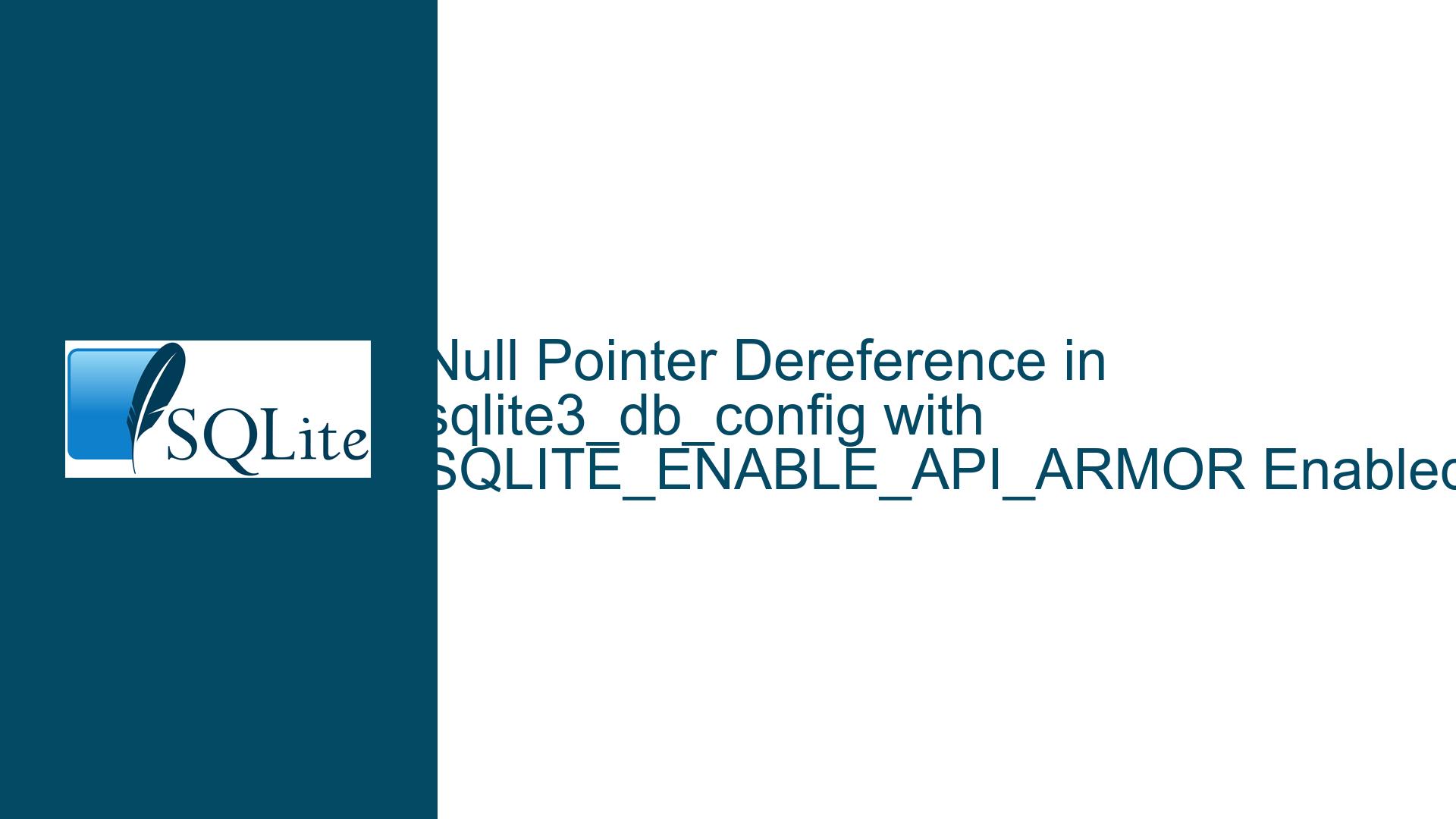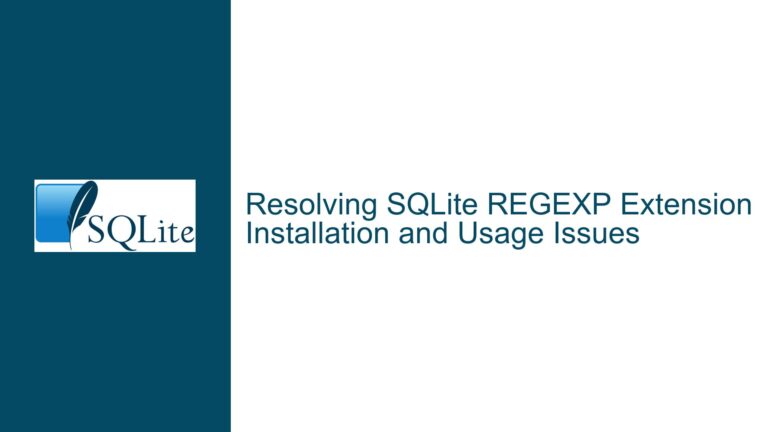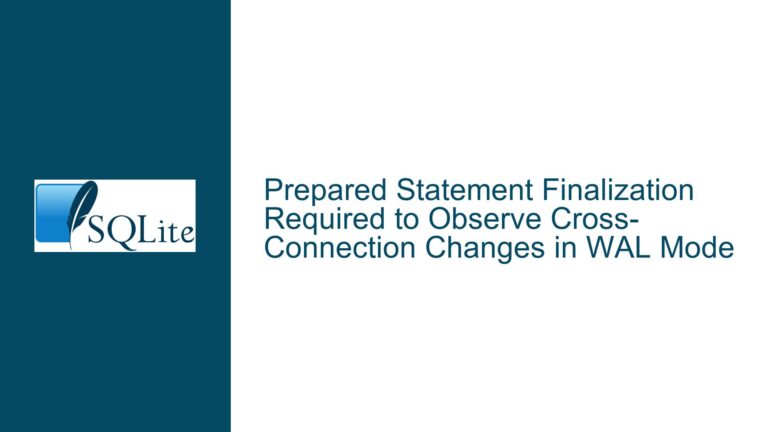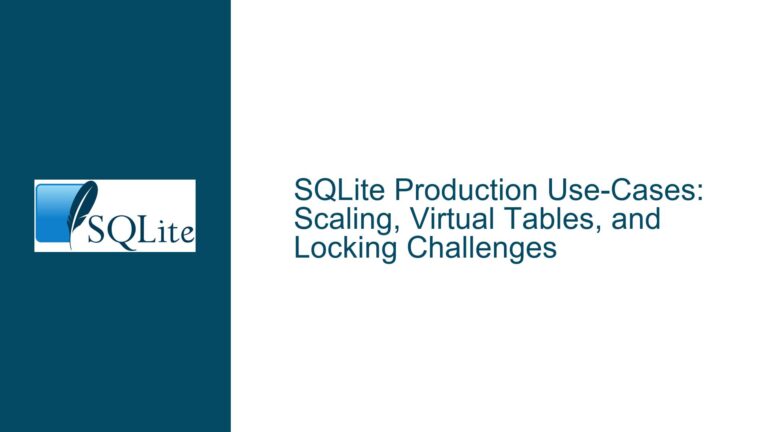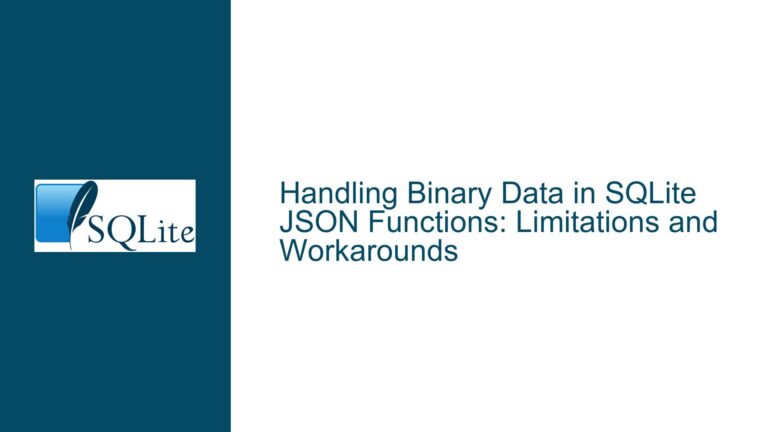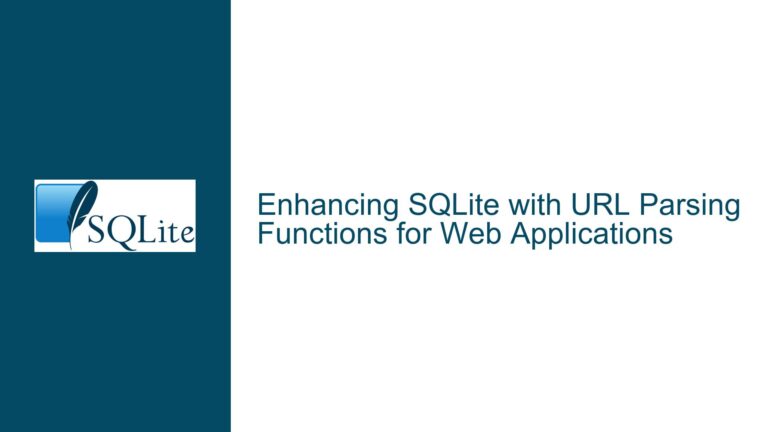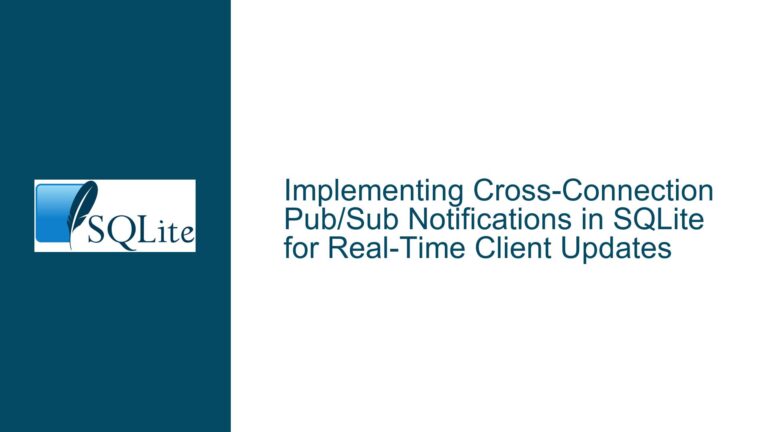Null Pointer Dereference in sqlite3_db_config with SQLITE_ENABLE_API_ARMOR Enabled
Understanding the sqlite3_db_config Null Pointer Dereference Under API_ARMOR
The SQLite C API function sqlite3_db_config() is designed to modify or query runtime configuration parameters associated with a specific database connection. When invoked with a valid sqlite3* database handle, it operates as expected. However, a critical issue arises when this function is called with a NULL database handle while SQLite is compiled with the SQLITE_ENABLE_API_ARMOR flag. This combination triggers a null pointer dereference, leading to undefined behavior—typically a segmentation fault or application crash.
The SQLITE_ENABLE_API_ARMOR compile-time option is a defense-in-depth mechanism intended to harden SQLite against accidental misuse of its APIs. When enabled, it adds runtime checks to validate parameters passed to certain API functions, reducing the likelihood of crashes or memory corruption caused by invalid inputs. For example, functions like sqlite3_prepare_v2() or sqlite3_exec() include checks for NULL database handles or statement pointers when API_ARMOR is active. However, prior to recent updates, sqlite3_db_config() lacked these safeguards despite the presence of API_ARMOR. This inconsistency created a scenario where developers relying on API_ARMOR for basic parameter validation could still encounter crashes due to unguarded functions like sqlite3_db_config().
The crash occurs because the function attempts to dereference the sqlite3* handle without first verifying its validity. In SQLite’s internal implementation, many functions access the sqlite3 structure’s fields directly. A NULL pointer here bypasses any initialization or error-handling logic, leading to an immediate memory access violation. The absence of a null check in sqlite3_db_config() under API_ARMOR violates the expected behavior of the hardening feature, which aims to return error codes (e.g., SQLITE_MISUSE) instead of crashing when invalid parameters are detected.
This issue is particularly insidious because developers may assume that enabling API_ARMOR universally guards against such crashes. The inconsistency between functions that include armor checks and those that do not creates a false sense of security. For instance, if a developer tests their code with functions like sqlite3_exec() (which includes armor checks) and later introduces sqlite3_db_config() without additional null checks, they might encounter unexpected crashes in production despite enabling defensive compile-time options.
Root Causes of the sqlite3_db_config Crash with NULL Database Handles
Missing Null Checks in API_ARMOR-Enabled Builds
The primary cause of the crash is the absence of a null pointer validation step insqlite3_db_config()whenSQLITE_ENABLE_API_ARMORis defined. The API_ARMOR feature is not universally applied to all SQLite functions; its implementation depends on manual audits and incremental updates. Functions deemed high-risk or commonly misused are prioritized for hardening. At the time of the reported issue,sqlite3_db_config()had not yet been audited or updated to include the armor checks, creating a gap in the defensive measures.Inconsistent Application of Defensive Programming Policies
SQLite’s API_ARMOR is an opt-in feature, not a comprehensive safety guarantee. The library’s developers explicitly state that its purpose is to mitigate accidental misuse, not to serve as a bulletproof validation layer. However, the inconsistency in applying armor checks across functions—especially those with similar risk profiles—can lead to developer confusion. For example,sqlite3_db_config()andsqlite3_limit()both accept asqlite3*handle, but prior to fixes, only the latter included armor checks under API_ARMOR. This disparity stems from the incremental nature of the armor audit process rather than a deliberate design choice.Performance vs. Safety Trade-offs in Low-Level Functions
A secondary factor influencing the lack of armor checks in some functions is performance. SQLite prioritizes efficiency in core components, and adding runtime checks to frequently called functions could introduce measurable overhead. For instance, thesqlite3_value_...()family of functions—which manipulate values within SQL expressions—were excluded from API_ARMOR hardening due to their performance-critical nature. Whilesqlite3_db_config()is not as performance-sensitive, its initial omission from armor checks reflects a broader prioritization strategy where safety features are selectively applied based on perceived risk and usage patterns.Ambiguity in API Contract Expectations
The SQLite API documentation does not explicitly guarantee that all functions will validate parameters when API_ARMOR is enabled. Developers familiar with armor’s intent might assume that passingNULLto any API function would result in a graceful error, but this is not contractual. The library reserves the right to crash on invalid inputs, as such cases are considered programmer errors. This ambiguity can lead to misunderstandings, especially when armor checks are present in some functions but missing in others.
Resolving and Preventing Null Pointer Crashes in sqlite3_db_config
Step 1: Validate Inputs at the Application Layer
Until SQLite’s API_ARMOR coverage is fully comprehensive, developers should enforce strict input validation in their code. Before calling sqlite3_db_config() or similar functions, explicitly check that the sqlite3* handle is non-NULL:
if (db != NULL) {
int dbConfig = sqlite3_db_config(db, 0);
} else {
// Handle error: log, abort, or return early.
}
This approach eliminates reliance on library-level safeguards and ensures robustness regardless of compile-time options.
Step 2: Upgrade to SQLite 3.44 or Later
The SQLite development team has addressed this specific issue in version 3.44 (and later) by extending API_ARMOR checks to sqlite3_db_config() and other previously unprotected functions. Developers should upgrade their SQLite integration to a patched version where available. Verify the version using sqlite3_libversion() or sqlite3_sourceid().
Step 3: Audit SQLite API Usage in Critical Paths
Review all uses of SQLite API functions that accept pointers to database connections, statements, or values. Identify functions lacking armor checks by testing with NULL inputs in a controlled environment (e.g., unit tests). Functions like sqlite3_db_status(), sqlite3_db_readonly(), and sqlite3_txn_state() should be scrutinized if they are used with dynamically allocated or nullable handles.
Step 4: Enable Debug Build Assertions
In debug builds, SQLite’s assert() statements can catch invalid pointer usage. For example, passing a NULL sqlite3_value* to sqlite3_value_int() will trigger an assertion failure if the library is compiled with debugging enabled. While not a substitute for runtime checks, this helps identify misuse during development:
# Compile SQLite with debugging enabled
CFLAGS="-DSQLITE_DEBUG" ./configure
make
Step 5: Leverage Static Analysis and Sanitizers
Use tools like Clang’s AddressSanitizer (ASan) or UndefinedBehaviorSanitizer (UBSan) to detect null pointer dereferences at runtime. These tools can identify crashes even in functions lacking armor checks:
# Compile with AddressSanitizer
CFLAGS="-fsanitize=address" LDFLAGS="-fsanitize=address" ./configure
make
Step 6: Monitor SQLite’s API_ARMOR Audit Progress
Follow SQLite’s changelogs and repository updates to track the expansion of API_ARMOR coverage. The project maintains a branch dedicated to auditing and patching functions. Subscribe to mailing lists or forum announcements to stay informed about hardening improvements.
Step 7: Adopt Defensive Coding Practices for SQLite Handles
Avoid passing SQLite objects across module boundaries without encapsulating them in manager classes or smart pointers (in C++). For example, use a factory pattern to allocate sqlite3* handles and ensure they are never null when accessed by downstream code:
sqlite3* create_db_handle(const char* filename) {
sqlite3* db = NULL;
int rc = sqlite3_open(filename, &db);
if (rc != SQLITE_OK) {
// Log error, clean up
return NULL;
}
return db;
}
// Usage:
sqlite3* db = create_db_handle("mydb.sqlite");
if (db) {
sqlite3_db_config(db, ...);
}
Step 8: Contribute to Community-Driven Validation Efforts
If encountering unprotected functions, report them to the SQLite team via the forum or mailing list. Provide minimal reproducible examples to expedite fixes. Community feedback has historically accelerated the prioritization of API_ARMOR audits.
Final Note on Intentional vs. Accidental Misuse
API_ARMOR is not designed to prevent intentional misuse, such as deliberately passing NULL to test error handling. Its purpose is to mitigate crashes stemming from unintentional oversights, like uninitialized variables or logic errors. Developers should treat strict parameter validation as a non-negotiable practice, even when using hardened builds of SQLite.
